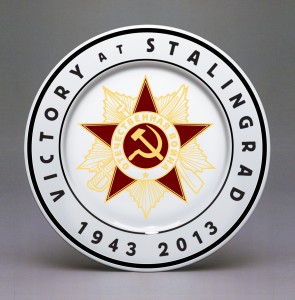Why Stalingrad matters today
 On the 70th Anniversary of the Victory at Stalingrad, Mark Perryman, explains why this battle and its outcome still matters today.
On the 70th Anniversary of the Victory at Stalingrad, Mark Perryman, explains why this battle and its outcome still matters today.
Seventy years ago, 2 February 1943 is the date of the Red Army victory at Stalingrad. From the moment of near-certain defeat the previous year the siege of the city, Hitler’s gateway to success on the Eastern Front, had been turned into an encirclement of the German forces and their eventual, and humiliating surrender. Up to this point in early 1943 despite the reverses in North Africa and the failure to launch an invasion of Britain the Nazi blitzkreig had appeared virtually invincible. Hyped up by the Goebbels propaganda machine German morale was at its height and the Allies could see no obvious end to the War. Stalingrad changed all of that, decisively.
This was a victory all committed to the anti-fascist war could celebrate. Stalingrad inspired those working underground in the resistance throughout Nazi occupied Europe. King George VI commissioned a sword that Churchill himself presented to Stalin, on its blade the inscription read ” To the steelhearted citizens of Stalingrad a homage of the British people.” The Communist Party was meanwhile engaged in what without doubt was the biggest and broadest campaign in its history, for a second front to relieve the awful pressure that the Nazi onslaught continued to impose on the Russian people.
Almost all of this history was to be hidden, first by the onset of the Cold War in the late 1940s. And then again during the second Cold War of the 1980s era of Thatcher and Reagan. At the time Scottish folksinger Dick Gaughan put the need to reclaim this past from the rewriting of the history books rather neatly in his song Think Again : “Do you think that the Russians want war? These are the parents of children who died in the last one.” But the sentiments that Gaughan turned into such a moving song were not only submerged under the weight of the Second Cold War, they also had to contest with a bitter division in the Communist Party that revolved sharply around attitudes to the Soviet Union while the Trotskyist Left defined itself by how it would classify its critique of the USSR. Stalingrad and all it represented became almost lost.
1989 and the fall of the Berlin Wall was celebrated at the time by right-wing commentators as the ‘end of history’. Their neo-liberalism of course in large part produced the economic crisis of some twenty years later and the austerity we are still being forced to endure and resist as a consequence. But 1989 had another perhaps less obvious after-effect. Unburdened by the Cold War rhetoric that had adopted the so-called Iron Curtain as a means to divide the world into the free and the unfree the true legacy of World War Two could be revisited by historians who previously might have been wary of according the Eastern Front the vital place it of course occupied in the defeat of Nazi Germany. Likewise the Communist, and to a lesser extent Trotskyist Left, were no longer defined by their reading of the development of the USSR into whatever they called it became. Anthony Beevor’s epic book, Stalingrad, first published in 1998, was a surprise and runaway best -seller . Beyond the Left this helped to begin to establish a popular , and mainstream, understanding of the epic heroism the Red Army victory at Stalingrad represented and more broadly the Eastern Front’s key role in the eventual defeat of Nazi Germany.
But the kind of breakthrough in understanding that Beevor’s book began was soon to be reversed by the aftermath of 9/11, the so-called ‘War on Terror’ ,the invasion of Iraq and the occupation of Afghanistan. The popularisation of the ‘Help for Heroes’ message has facilitated the militarisation of national culture, the FA Cup is carried on to the Wembley Final pitch nowadays by uniformed members of the armed forces, while Remembrance Sunday has effortlessly connected Afghanistan to World Wars Two and One with no distinction made between the causes served by these vastly different conflicts. World War Two has become an epic of nostalgia entirely disconnected from the cause of anti-fascism, the sacrifices made by the Red Army on the Eastern Front once again hidden from history. Stalingrad, forgotten, scarcely meriting a mention in the mainstream media despite its fixation with all things WW2.
Stalingrad’s 70th Anniversary of course is not something to celebrate, on the Eastern Front an estimated 25 million Soviet citizens lost their lives. But it is an opportunity to engage with the processes that for long periods effectively hid the crucial role of Stalingrad and the other epic battles in the East that would lead to the eventual defeat of Nazi Germany. And at the same time connect that history to the cause, of anti-fascism, then, now and for ever.
Philosophy Football have produced a 70th Anniversary Victory at Stalingrad commemorative plate. A limited edition of 70, individually numbered, available from here
Left Unity is active in movements and campaigns across the left, working to create an alternative to the main political parties.
About Left Unity
Read our manifesto
Left Unity is a member of the European Left Party. 
Read the European Left Manifesto
ACTIVIST CALENDAR
Events and protests from around the movement, and local Left Unity meetings.
More events »
GET UPDATES
Sign up to the Left Unity email newsletter.
CAMPAIGNING MATERIALS
Get the latest Left Unity resources.



